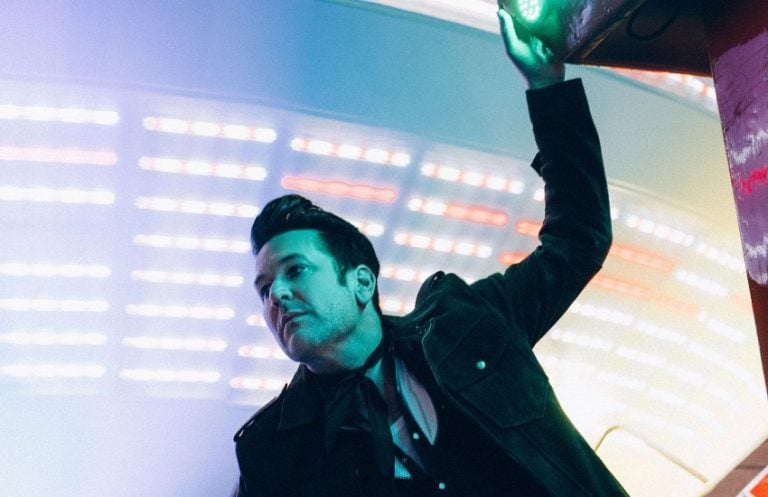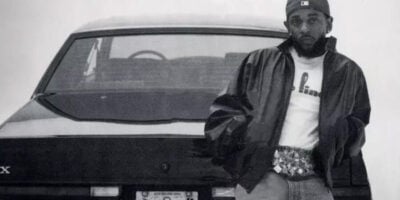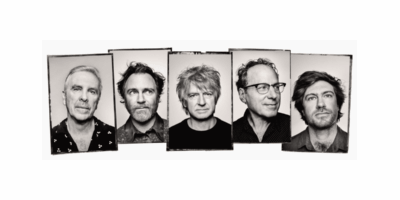When you’re the frontman of one of Australia’s greatest ever bands, the downtime of lockdowns was only going to produce one thing: music. Shut away from the world and trying to comprehend the chaos of the COVID-19 pandemic, Kav Temperley created his sophomore solo album.
With the writerly title Machines of Love & Grace, the record is a product of its time, concerned with the effects of the pandemic on our collective minds.
“Machines Of Love & Grace started its life in the very first week of COVID,” the Eskimo Joe icon explains, who cites this album as his most ambitious work to date. “Myself and my wife had just returned from the U.S. and then one day later the whole entire world shut down.
“At the same time, I also came down with a mystery virus that was too early in the pandemic to test for COVID. So while everyone went into lockdown, I began to isolate myself in my bedroom only talking to my family through a small crack in the bedroom window.”
Writing his second solo record, then, became a coping mechanism, a way to come to terms with what was happening outside his home.
Released yesterday, Machines of Love & Grace crucially contains enough kernels of hope for listeners heading into a post-pandemic future, thanks to Temperley’s perennially potent storytelling power.
To celebrate the release of his new album, we got the singer to take us through every track, and his thoughtful answers didn’t disappoint.
Love Music?
Get your daily dose of metal, rock, indie, pop, and everything else in between.
Temperley will also be launching Machines of Love & Grace with a solo tour in February, performing in Sydney, Melbourne, Brisbane, Adelaide and Perth. Tickets go on sale next Tuesday, October 25th at 10am AEDT, and can be found via his official website.
Kav Temperley’s Machines of Love & Grace is out now.

‘Emergency in D Minor’
I always wanted this album to read like some sort of post-apocalyptic true story, just like my favourite writers Margaret Atwood, Haruki Murakami or Kazuo Ishiguro. This was the last song written for the album and was intended to be a prologue or introduction.
I wrote the song while I was away playing my first post-pandemic shows with Eskimo Joe. I found myself staring out at the city of Melbourne from a giant glass skyscraper, fascinated that the world still existed.
I remember feeling overwhelmed, like one of those deep sea fish that explode when you bring them up to the surface due to the lack of pressure.
So our story begins by looking out of the window at the world, wondering if there’s anyone still out there. I feel like it’s easy to tell people to get into their pyjamas but a lot harder to tell them to take them off and emerge from their bedrooms.
‘Homesickness’
I wrote this song with Anna Laverty, who is a good friend and world-renowned record producer. One of the things that came up for a lot of people while they were locked down and couldn’t return back to their “home” was this idea that at what point does somewhere become your home?
Anna was remembering a trip back to her native England where she suddenly realised she no longer had anything in common with these people she used to call family. It’s the idea that “home” doesn’t have to be a physical place but can live in the hearts of the people we love.
‘Machines of Love & Grace’
One of the big issues that came up over the past three years was the very intimate way we were now living through our phones.
On the one side you have this wonderful connectivity where you can speak to loved ones on the other side of the world, or be having drinks on your back porch with friends who were locked down in another city.
And on the other side you find yourself “doomscrolling” through Facebook or Instagram with no idea how much time has passed.
Our devices have become so important to us, and now that we have them we can’t live without them. I’m not passing any judgment as I’m just as guilty as the next person – all I’m saying is that we need to be aware of the road we are heading down.
‘Graduation Day’
This is a song about a sense of place and how we often travel full circle to find what we’re looking for.
During the pandemic I spent more time at home than I had done since starting a band at 18, and I saw so many people I had grown up with doing the same thing they had always done.
It reminded me of all the old stories about growing up in my home town of Fremantle. We used to have this ritual where on graduation day if you went to John Curtin Senior High School you would go down to the old Freo traffic bridge and jump off into the river as some sort of rite of passage.
After I had been working on this song for a while, I gave my good friend Katy Steele a call and asked her if she wanted to come over for a jam and help write a song. The result is ‘Graduation Day’.
‘The Fence’
I went to visit my good friend John Butler at his home in the beautiful surrounds of Margaret River, and we talked for a while about where our heads were at with everything, from the world to our job as endangered musicians to some of the very real world decisions we were having to make around the environment and vaccinations.
What came out of that conversation was a song called ‘The Fence’. It’s about how we are living through a time where there is no room to sit on the fence.

‘Last of The Wine’
My mother in law came to me and showed me an article about the rise of domestic violence over the lockdown period and how a lot of people were locked up with their abusers. She said “you need to write a song about this.”
It’s a pretty heavy subject and I wasn’t sure I was qualified or up for the challenge, but what emerged was ‘Last of the Wine’, an upbeat song about a very dark subject matter.
‘Twin Flame’
‘Twin Flame’ is the emotional low point of the album, but it offers a path to hope.
I was reflecting on the fact that I felt so lucky to be with my wife during this lockdown period. We’re perfectly happy just hanging out together and that’s because we started off as best friends. Her name is Beth so before we got together everyone would refer to her as my “Beth’d friend”.
We realised at some point that if we didn’t live our truth with each other, then a very fragile and sacred flame would be extinguished. This is the story about the year before we got together.
‘Emergency Interlude’
This was recorded literally moments before I had to submit the final version of the record and I just thought the album needed something to blend the two songs ‘Twin Flames’ and ‘Friendship Fires’ together.
I love it when my favourite bands do interludes, it’s something that exists outside of the ‘singles’ culture that has sprung up around streaming services.
‘Friendship Fires’
There’s often a point where you need to trim the friendship tree – it sounds terrible when you put it into words, but sometimes people just aren’t good for you so it’s up to you as an adult to step away from these old stories.
‘Just a Fool’
Most of my album was recorded in my little studio in the west end of Fremantle, so I had limitations around where I could record and with whom.
But the lack of options turned out to be wonderful because I had a palette of colours that I had to use and this brought a tangible feel and sound to the album.
For example, I share my studio with a fantastic percussionist named Steve Richter. The whole of our studio is decorated wall to floor with fantastic percussion instruments that he’s been collecting over his life.
So for the song ‘Just a Fool” I had Steve lay down a bed of percussion that I built the song around. There’s everything from goats hooves to tribal wooden drums from Papua New Guinea.
‘Waterfalls’
This song sounds quite sad but it’s actually an offering of hope to my beautiful wife – even through the darkest and hardest times “i will always build waterfalls for you”.
The story sits along side ‘Twin Flames’ and talks about the very confusing time leading up to myself and my wife finally making the best stupid mistake of our lives and getting together. And just like both ‘Last of the Wine’ and ‘Twin Flames’ it also talks about alcohol as a coping mechanism in life.
I don’t begrudge anyone for having one more drink just to feel a little lighter and a little more sane after a trying day, but it’s always such a fine line between coping with life and falling down a deep dark hole.


































